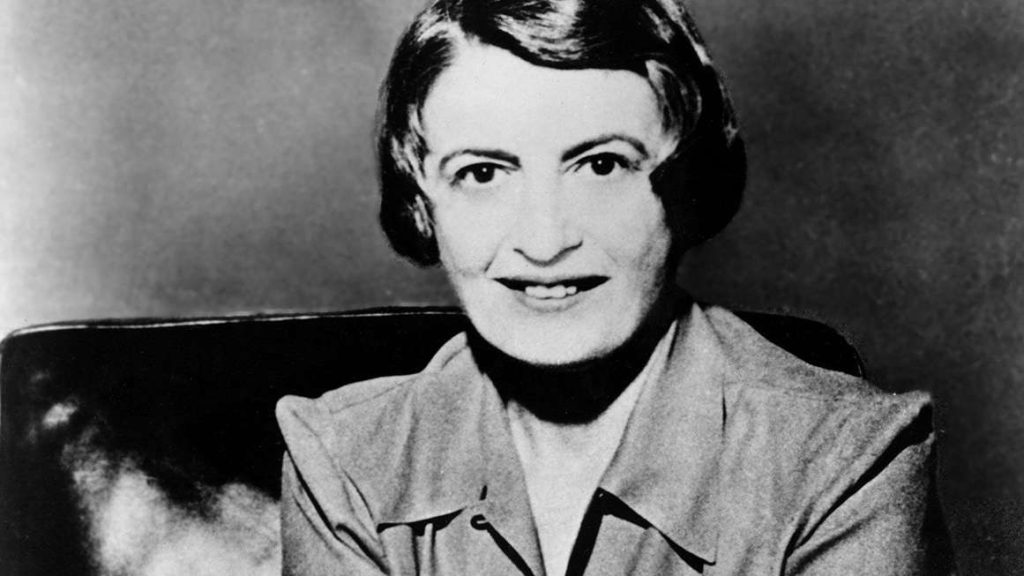Ukrainian forces continue to pummel Russian-occupied Crimea and assassinate high-ranking war criminals on what was once their sovereign territory. Vladimir Putin, a graduate of Leningrad State University, says his seizure is a matter of historical prerogative. The “true sovereignty of Ukraine,” he claims, “is possible only in partnership with Russia.” Another graduate of Leningrad State University, Alisa Rosenbaum—better known by her nom de plume Ayn Rand—foresaw and condemned the philosophical underpinnings of Putin’s war in Ukraine.
Rand was only 12 when she and her family fled from Petrograd to Ukrainian Crimea in 1917, during the withering nationalization campaigns of the Bolsheviks. She and her family returned in 1921 to Petrograd, where, despite the abysmal conditions brought about by civil war and collectivization, she took advantage of the Communists’ liberal policy of allowing women into universities. Just before graduating, however, she was summarily purged for being excessively bourgeois—but reinstated at the behest of visiting British scientists. Personal experience, unsurprisingly, led her to abhor the injustices inflicted by collectivist ideologues. “Call it fate or irony,” she later wrote, “but I was born, of all countries on earth, in the one least suitable for a fanatic of individualism, Russia.”
Rand’s 1964 essay collection The Virtue of Selfishness, composed amid the tensions of the Cuban missile crisis, helps illuminate the moral underpinnings of the geopolitical tensions surrounding Ukraine today.
She begins by clarifying the difference between collective and individual rights: “A group has no rights,” said Rand, “and any group that does not recognize this principle is not an association, but a gang or a mob.” She understood that granting “collective rights” was a trick to ensure that “rights belong to some, but not to others—that some men have the ‘right’ to dispose of others in any manner they please—and that the criterion of such privileged position consists of numerical superiority.”
Rand introduced individual rights into the otherwise realpolitik terrain of how a nation may act on the world stage. “The amorality of [the] collectivist mystique,” she said, “is particularly obvious today in the issue of national rights.” A nation, she said, “like any other group, is only a number of individuals and can have no rights other than the rights of its individual citizens. A free nation—a nation that recognizes, respects and protects the individual rights of its citizens—has a right to its territorial integrity, its social system and its form of government.”
Things are different for nations without those qualities. “A nation that violates the rights of its own citizens cannot claim any rights whatsoever,” Rand insisted. “The right of ‘the self-determination of nations’ applies only to free societies or to societies seeking to establish freedom; it does not apply to dictatorships.”
Not only did dictatorships lose moral standing, according to Rand, but they opened themselves to just invasion by rights-upholding nations. “Dictatorship nations,” she wrote, “are outlaws.” She believed any free nation “had the right to invade Nazi Germany and….the right to invade Soviet Russia, Cuba or any other slave pen.” While she didn’t believe it was a free nation’s duty to liberate other nations at the price of self-sacrifice, she believed it was a free nation’s right “when and if it so chooses.”
In the context of 1960s geopolitics, that sentiment was richly controversial. The Bay of Pigs debacle (April 1961), followed by the Cuban missile crisis (October 1962), figured centrally in The Virtue of Selfishness. In retrospect, she seems to have been grappling with the implications of her logic. “The invasion of an enslaved country is morally justified,” she said, “only when and if the conquerors establish a free social system….based on the recognition of individual rights.” And since there was “no fully free country today, since the so-called ‘Free World’ consists of various ‘mixed economies,’ it might be asked whether every country on earth is morally open to invasion by every other.”
The answer, she said definitively, was no. “There is a difference between a country that recognizes the principle of individual rights, but does not implement it fully in practice, and a country that denies and flouts it explicitly.”
Rand believed that four characteristics branded a country as a dictatorship: one-party rule, executions without trial (or with a mock trial) for political offenses, the nationalization or expropriation of private property, and censorship. A country guilty of these outrages forfeits any moral prerogatives, any claim to national rights or sovereignty, and becomes an “outlaw.”
In Rand’s formulation, then, Putin’s Russia is the living embodiment of an “enslaved country” and is open to a morally justified invasion. But no such invasion is remotely plausible. The threat of nuclear retaliation makes a conventional military invasion inconceivable. Still, as Russia continues its devastating operations in Crimea and the Donbas, it may splinter under the weight of its own injustice. Putin’s “Special Military Operation” may be the final manifestation of Ivan Vovchuk’s 1968 observation: “Bolshevism started building its empire by starting war against Ukraine. This empire will end its existence with a victorious war of Ukraine against Moscow.”
In other words, the country Rand said was “least suitable for a fanatic of individualism” may find itself a fractured region of freedom-hungry individual republics as a result of its immoral invasion of Ukraine.
The post Ayn Rand in Ukrainian Crimea appeared first on Reason.com.







